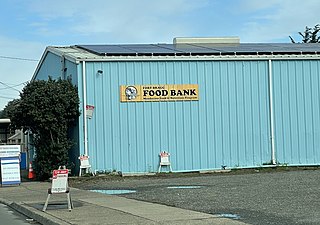
A food bank is a non-profit, charitable organization that distributes food to those who have difficulty purchasing enough to avoid hunger, usually through intermediaries like food pantries and soup kitchens. Some food banks distribute food directly with their food pantries.
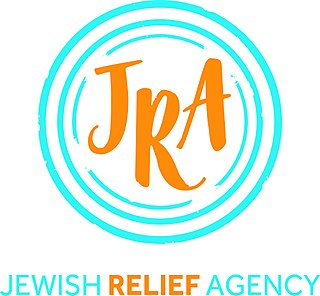
The Jewish Relief Agency (JRA) is a charitable organization and independent 501(c)(3) nonprofit organization), that serves over 6,000 diverse low-income individuals across Greater Philadelphia.
The Low Income Home Energy Assistance Program is a United States federal social services program first established in 1981 and funded annually through Congressional appropriations. The mission of LIHEAP is to assist low income households, particularly those with the lowest incomes that pay a high proportion of household income for home energy, primarily in meeting their immediate home energy needs. The program, part of the United States Department of Health and Human Services (HHS), is funded by grants appropriated from the federal government.
In the United States and its territories, Community Action Agencies (CAA) are local private and public non-profit organizations that carry out the Community Action Program (CAP), which was founded by the 1964 Economic Opportunity Act to fight poverty by empowering the poor as part of the War on Poverty.
Catholic Community Services is a ministry of the Roman Catholic Diocese of Salt Lake City that operates various programs in Salt Lake City and Ogden designed to provide help and create hope for those impacted by homelessness as food insecurity. CCS' Migration and Refugee Services department also equips and empowers immigrants and refugees settling into the life in the United States. Its mission is to practice gospel values of love, compassion, and hope through service, support, and collaboration. It is a member of the National organization Catholic Charities. Its Main Office is located at 224 North 2200 West Salt Lake City, Utah.
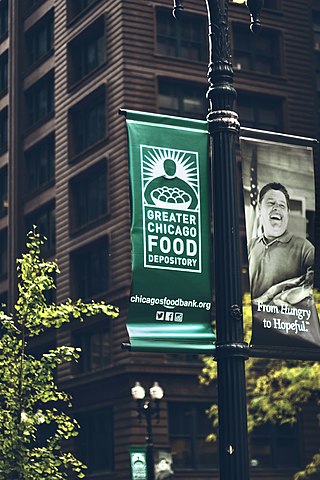
The Greater Chicago Food Depository (GCFD) is a nonprofit organization that fights hunger throughout Cook County, Illinois. The GCFD distributes donated and purchased food through a network of 700 food pantries, soup kitchens, shelters and community programs, serving more than 800,000 adults and children every year. In fiscal year 2016, the GCFD distributed more than 70 million pounds of nonperishable food, produce, dairy products, and meat - the equivalent of more than 160,000 meals every day. Of the $96,883,955 spent in 2016, over 90% went to direct food distribution programs.
The Emergency Food Assistance and Soup Kitchen-Food Bank Program provides United States Department of Agriculture (USDA) commodities to emergency feeding organizations to help with the food needs of low-income populations. It also authorizes grants to states to help with the state and local costs of transporting, storing, and distributing the commodities to the appropriate local agencies and organizations.
P.A.W.S. or Pets Are Wonderful Support refers to a number of North American non-profit organisations that advocate the value of the bond between humans and their pets as a means to extend a person's quality of life and life-span, specifically elderly or disabled persons. The PAWS organizations provide subsidized pet food, veterinary care, pet medication and human services such as dog walking, litter box cleaning and transportation to thousands of clients.
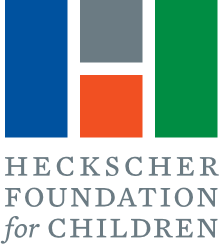
The Heckscher Foundation for Children is a New York City-focused private foundation that provides grants to underserved New York City youth. Often, the foundation's grant-giving takes the form of program support, capacity-building, capital projects and general operating support.
The Human Resources Administration or Department of Social Services (HRA/DSS) is the department of the government of New York City in charge of the majority of the city's social services programs. HRA helps New Yorkers in need through a variety of services that promote employment and personal responsibility while providing temporary assistance and work supports. Its regulations are compiled in title 68 of the New York City Rules. The current Commissioner of HRA is Molly Wasow Park, who was appointed to the position by Mayor Eric Adams. HRA is the largest city social services agency in the United States. It has a budget of $9.7 billion, employs over 14,000 people, and serves over 3 million New Yorkers.
Philabundance is a non-profit food bank that serves the Philadelphia and Delaware Valley region of Pennsylvania, United States. It is the largest such organization in the region.

Community gardens in the United States benefit both gardeners and society at large. Community gardens provide fresh produce to gardeners and their friends and neighbors. They provide a place of connection to nature and to other people. In a wider sense, community gardens provide green space, a habitat for insects and animals, sites for gardening education, and beautification of the local area. Community gardens provide access to land to those who otherwise could not have a garden, such as apartment-dwellers, the elderly, and the homeless. Many gardens resemble European allotment gardens, with plots or boxes where individuals and families can grow vegetables and flowers, including a number which began as victory gardens during World War II. Other gardens are worked as community farms with no individual plots at all, similar to urban farms.
The New York City Coalition Against Hunger (NYCCAH) is a nonprofit organization, which aims to “enact innovative solutions to help society move ‘beyond the soup kitchen’ to ensure economic and food self-sufficiency for all Americans”. NYCCAH works collaboratively with local, state, and national legislatures as well as New York residents and community associations. In contrast to other organizations, NYCCAH generally does not distribute food but rather concerns itself with providing technical assistance to groups which do while simultaneously affecting hunger policy at a more macro-urban scale.
The Housing Authority of the City of Milwaukee (HACM) is a municipal agency of Milwaukee, Wisconsin dedicated to providing public housing and services for residents of the city of Milwaukee. The agency was established in 1944 and is responsible to a board of commissioners appointed by the mayor.

Hunger in the United States of America affects millions of Americans, including some who are middle class, or who are in households where all adults are in work. The United States produces far more food than it needs for domestic consumption—hunger within the U.S. is caused by some Americans having insufficient money to buy food for themselves or their families. Additional causes of hunger and food insecurity include neighborhood deprivation and agricultural policy. Hunger is addressed by a mix of public and private food aid provision. Public interventions include changes to agricultural policy, the construction of supermarkets in underserved neighborhoods, investment in transportation infrastructure, and the development of community gardens. Private aid is provided by food pantries, soup kitchens, food banks, and food rescue organizations.
Community food security (CFS) is a relatively new concept that captures emerging ideas about the central place of food in communities. At times it refers to the measure of food access and availability at the community level, and at other times to a goal or framework for place-based food systems. It builds upon the more commonly understood concept of food security, which refers to food access and availability at an individual or household level (in health and social policy, for instance) and at a national or global level (e.g., in international development and aid work). Hamm and Bellows (2003) define CFS as “a situation in which all community residents obtain a safe, culturally acceptable, nutritionally adequate diet through a sustainable food system that maximizes community self-reliance and social justice” (p. 37). CFS involves social, economic, and institutional factors, and their interrelationships within a community that impact availability and access to resources to produce food locally. It takes into account environmental sustainability and social fairness through measures of the availability and affordability of food in that community relative to the financial resources available to purchase or produce it.
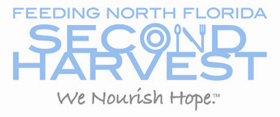
Second Harvest North Florida (SHNF) is a 501(c)(3) non-profit organization located in Jacksonville, Florida, that performs food rescue and redistribution to partner agencies in one quarter of Florida's 67 counties. The charitable organization has been active for over 30 years.

Safe Horizon, formerly the Victim Services Agency, is the largest victim services nonprofit organization in the United States, providing social services for victims of abuse and violent crime. Operating at 57 locations throughout the five boroughs of New York City. Safe Horizon provides social services to over 250,000 victims of violent crime and abuse and their families per year. It has over 800 employees, and has programs for victims of domestic violence, child abuse, sexual assault, and human trafficking, as well as homeless youth and the families of homicide victims. Safe Horizon's website has been accessible for the Spanish-speaking population since 2012. Safe Horizon has an annual budget of over $63 million.
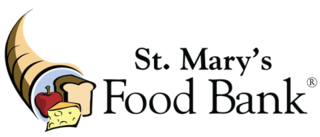
St. Mary's Food Bank Alliance is a nonprofit, nonsectarian organization located in Phoenix, Arizona. Founded in 1967 by John van Hengel, St. Mary's was the first modern organization to operate using the food bank model, which spread throughout U.S. and the rest of the world. Today, St. Mary's is recognized as the world's first food bank.









